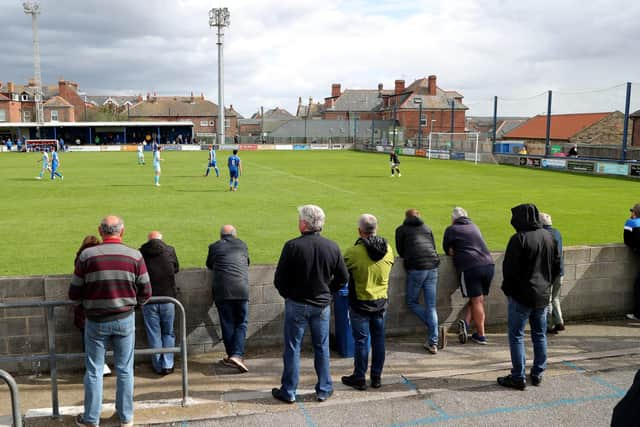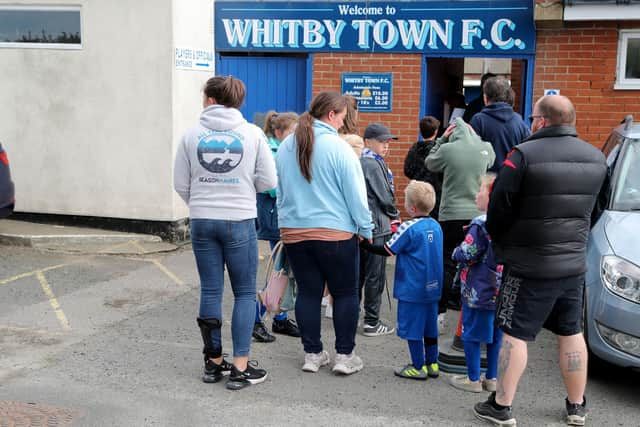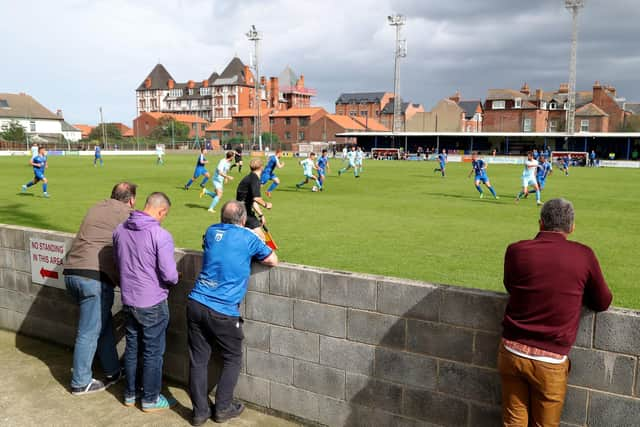Whitby Town sound 'slow death' warning as non-league clubs combat climate change
For Northern Premier League side Whitby Town, the reality is much starker as they face the consequences of a rapidly changing climate.
Prior to last weekend’s Green Football Weekend – a climate-focused campaign – the Seasiders had seen their last three home matches postponed due to the impact weather conditions have had on their pitch.
Advertisement
Hide AdAdvertisement
Hide AdThe North Yorkshire side’s commercial manager Lee Bullock estimates a loss of around £12,000 in the past month due to these called-off games, and believes such missed revenue is amounting to a “slow death” for the club.


Bullock told The Yorkshire Post: “The only real income we have is our home fixtures and (getting) people through the turnstiles, which results in secondary spends, visits to the clubhouse and purchases being made in the shop.
“If you can’t get fixtures on, it’s a slow death at this level.
“It’s something now that’s becoming more and more apparent every year – the pitch can’t cope with the weather. The fixtures that are cancelled come back round, but Tuesday nights are nowhere near as well attended as Saturday kick-offs are, so it is a loss over time.”
Advertisement
Hide AdAdvertisement
Hide AdTheir plight was recently documented by the ‘Game Changer II’ report, which identified the severe problems caused by regularly frenetic weather at grassroots level in football.


Within the study – which built on the FA’s estimate that around 120,000 fixtures are lost each season due to weather-related issues – particular emphasis was placed on the need for further funding from governing bodies to ensure clubs can overcome the challenges posed by climate change.
This is something Bullock views as essential for the long-term maintenance of The Blues.
“The funding is so difficult to get,” he added.
“We can’t get any funding for a 4G pitch because the town is too small and there is already one in the town that has Football Foundation backing.


“They’ve said there will be no chance of a grant or help.
Advertisement
Hide AdAdvertisement
Hide Ad“The cost of the 4G pitch now is outrageous, so how on earth can a club like us get one unless a millionaire comes along? It’s not going to happen.
“At this level now and at other levels of non-league, we are feeding the system to the top.
“Without us the football pyramid fails, yet there is little help.”
Having a stadium only metres from the sea is a quality most visitors to The Turnbull Ground naturally appreciate on sight, and it often means crowds of up to 800 spectators attend home games.
Advertisement
Hide AdAdvertisement
Hide AdBut if these fixtures cannot be played, no such healthy attendance fixtures can be achieved and the presence of this spectacular view soon becomes pointless.
Town board member Paul Connolly believes this ongoing predicament is one that will also have a significant impact on the local community, beyond just the game-day atmosphere.
Discussing the Game Changer II report, Connolly said: “We like to offer our facilities out to the community, particularly the pitch – there’s a lot of local clubs that like to play on it – but we simply can’t offer that because once the rain comes, as we can’t even play our home games on it.
“It’s a real concern for me as a supporter that I’m not going to be able to watch football.
Advertisement
Hide AdAdvertisement
Hide Ad“Additionally, as a board member it’s a concern about how it affects the football club financially going forward.”
To further hamper such worries, fresh analysis by the British Association of Sustainable Sport suggests approximately 40 per cent of football spectators and players say they have experienced weather extremes associated with climate change in the past year.
These situations can be incredibly frustrating for those involved, given the time, effort and travelling typically required to attend a match.
Nonetheless, Bullock believes supporters ought to be more patient when it comes to fixture postponements – with some too willing to criticise a game’s postponement. Last month’s game between The Seasiders and Guiseley AFC saw the pitch deemed unplayable less than 10 minutes before kick-off.
Advertisement
Hide AdAdvertisement
Hide AdComplaints were immediately directed towards the club’s staff, with Bullock insisting Whitby would never want to place spectators in such a position.
“We have a groundsman who has a family and a full-time job,” he said.
“We have a team of very dedicated volunteers who do not earn a penny, who come and work really hard and try to get it right.
“We’ve got limited resources, limited machinery, and when games are called off we do come in for criticism. Obviously we don’t want to call games off. It’s a last resort. We want to do everything to get the football on.”
Comment Guidelines
National World encourages reader discussion on our stories. User feedback, insights and back-and-forth exchanges add a rich layer of context to reporting. Please review our Community Guidelines before commenting.